Astonishing the Gods Read online
Start Reading
About this Book
About the Author
Reviews
Also by this Author
Table of Contents
www.headofzeus.com
Introduction to the new edition
Astonishing the Gods was written in the summer of 1993. It was a lovely summer and I was fasting at the time. The novel came out all of a piece, handwritten, in a black casebound notebook. Then it was carefully shaped afterwards.
Ever since I was a boy I wanted to write a book like this one. I never thought I actually would. There are certain books that have an oblique conception. Notions that have lived long in the mind emerge when the inner and outer worlds align for their births. The catalyst for this birth was a curious incident on the Edgware Road in London. That and a lingering sadness for the souls of black slaves re-dreaming the world at the bottom of the Atlantic Ocean. How to redeem that suffering. The Edgware Road incident itself is unimportant; it was the question I asked of myself because of it that was significant. The question passed into the inspiration, and a meditation persisted, a meditation on invisibility.
The theme of invisibility has been famously played in many keys. Invisibility as history, invisibility as the paradoxical condition of redemption, interested me. In a world blinded by the visible might not its opposite be fruitful as a contemplation of the human condition?
The philosophical fable, from Rasselas to Candide, reveals how much we dream of quests to unknown places. Astonishing the Gods is of that family. In it everything is allusive, indirect – something I learned from Giorgione. It is written with light but fringed with darkness.
The hero of this novel finds what he did not seek, and goes where he did not intend to go. As I did in writing it. I set out to find one thing, but found another. Maybe what seeks us is better than what we seek. Maybe accidental discoveries constitute the magic heart of creativity.
Little Venice, London
August 2014
Book 1
1
It is better to be invisible. His life was better when he was invisible, but he didn’t know it at the time.
He was born invisible. His mother was invisible too, and that was why she could see him. His people lived contented lives, working on the farms, under the familiar sunlight. Their lives stretched back into the invisible centuries and all that had come down from those differently coloured ages were legends and rich traditions, unwritten and therefore remembered. They were remembered because they were lived.
He grew up without contradiction in the sunlight of the unwritten ages, and as a boy he dreamt of becoming a shepherd. He was sent to school, where he learnt strange notions, odd alphabets, and where he discovered that time can be written down in words.
It was in books that he first learnt of his invisibility. He searched for himself and his people in all the history books he read and discovered to his youthful astonishment that he didn’t exist. This troubled him so much that he resolved, as soon as he was old enough, to leave his land and find the people who did exist, to see what they looked like.
He kept this discovery of his recent invisibility to himself and soon forgot his dream of becoming a shepherd. But in the end he didn’t have to wait till he was old enough. One night when the darkness was such that it confirmed his invisibility in the universe, he fled from home, ran to the nearest port, and stole off across the emerald sea.
He travelled for seven years. He did all the jobs that came his way. He learnt many languages. He learnt many kinds of silences. He kept his mouth shut as much as possible and listened to all the things that men and nature had to say. He travelled many seas and saw many cities and witnessed many kinds of evil that can sprout from the hearts of men. He travelled the seas, saying little, and when anyone asked him why he journeyed and what his destination was, he always gave two answers. One answer was for the ear of his questioner. The second answer was for his own heart. The first answer went like this:
‘I don’t know why I am travelling. I don’t know where I am going.’
And the second answer went like this:
‘I am travelling to know why I am invisible. My quest is for the secret of visibility.’
Those who worked with him in those years saw him as a simple man. Actually, they didn’t see him at all.
2
After travelling for seven years he arrived at a strange port. The town seemed empty. The houses were silent. He disembarked and found himself in a great square patterned in black and white, as if it were a giant chessboard. The air was tinged with an orange glow. There was an eternal motionlessness about everything that made him feel he had wandered into a disquieting dream.
The town was empty, but he could feel that there were people all around. He fancied he heard an occasional whisper in the air. He was so disturbed by the strangeness of the town that he wandered deeper into its riddle. But the town was a riddle without an answer. Everywhere he heard tinkling bells. Happy voices laughed in the gentle wind. Even their laughter was a kind of secret. In the far corner of the square he heard sweet voices reciting the ineffable names of things. He was so overcome with the invisible enchantments of the town that he didn’t want to leave.
He had been following the musical voices of young girls whispering unseen beneath the flavoured moonlight of that mysterious town, when he heard the blasts from the ship calling him to return. The moonlight, glowing on the chessboard patterns of the town’s magnificent square, filled his heart with a beautiful solitude that would haunt him for the rest of his life.
As he turned to go, tearing himself unwillingly from the limpid voices of the girls, he was suddenly touched with the scent of honeysuckle. He started to weep. A haunting sonata, yellow and lilac amongst the dazzling illusions of the quivering chessboard, started up far behind him. He wept as he listened to the flute melodies piping out forgotten moments of his life.
He was still weeping when a gentle voice, out of the fragrant air, said:
‘Why are you crying?’
He started. Not seeing who was addressing him, but not overly disturbed by it, he replied:
‘I am weeping because I don’t understand the beauty of this island.’
‘Then why don’t you stay?’
‘But how can I stay? I can’t see the inhabitants. I don’t even know where I am.’
‘You shouldn’t worry. The inhabitants can’t see you either. At least most of them can’t. You are just a voice to me. But everything is in your voice. Besides, you are seeking something that you’ve already found, but you don’t know it. Such are the causes of unhappiness.’
‘Where is this place?’
‘It doesn’t have a name. We don’t believe in names. Names have a way of making things disappear.’
‘I don’t understand.’
‘When you name something it loses its existence to you. Things die a little when we name them. I am speaking only of this island. I cannot speak for anywhere else.’
‘So if you don’t want things to disappear what do you do?’
‘We think of them. We dwell in them. We let them dwell in us. You ask many questions: if you are so interested why don’t you stay and live with us and learn our mysteries?’
‘Thank you, but my ship is calling me. I must set sail, or I will never find the things that made me leave my homeland.’
‘You may learn much here.’
‘But I may never catch another ship again. I don’t know how frequently they come here. And then I would miss the sea and the journey.’
‘The sea is always there, ships come when they will, the journey always continues, but this island is discovered only once in a lifetime – if you’re lucky.’
The ship’s blast sou
nded again, calling three times in stern warning. He shuddered at the sound. When the third blast fell silent, he listened to the plaintive wind. He listened to the flute choruses threading the cypress trees. He listened to the sound of water flowing among the wreaths of acanthus leaves in the marble fountain.
Lost in wonder, he stared at the white harmonic buildings round the square. He noticed their pure angles, their angelic buttresses, and their columns of gleaming marble. He inhaled the fragrance of childhood, of sweet yellow melodies, and of ripening mangoes. When a woman’s voice began singing from the spire of the blue temple of that land, the wind itself became silent. He noticed how all things invisible seemed to become attentive to the glorious singing which poured a golden glow into the limpid moonlight. He found himself smiling. When the singing stopped, and a new happy silence lingered, he decided to stay.
3
The ship set sail without him. He watched as it rocked its way over the green waters. The port was still deserted and all over that island the silence became deeper. As the ship disappeared over the horizon, time changed around him. Slowly, he ceased to be aware of himself. One moment he was in the middle of the shimmering chessboard square, and the next moment he found himself wandering over streets of polished glass, wandering through alleys paved as if with stained-glass windows. Light poured upwards from below, as if the island’s relationship with the moon and sky had become inverted.
The voice that was his guide was silent; it was only the instinct of another presence which calmed him as he walked through the serenity of the island.
He was struck by the buildings. They were magnificent; they were bold; they had astounding facades, with stately columns and conch-shell capitals and graceful entablatures. The pedestals displayed a lofty and balanced sense of proportion. The buildings, all apparently empty, loomed everywhere. They attracted the lights, they gave off an air of grandeur and majesty, and yet they seemed to hang in mid-space. They appeared to rest on nothing, suspended. Even the great churches, with their golden domes and their moody spires, seemed to be made of an ethereal substance. The buildings, in their perfection, looked like some kind of dream-created illusion. He was puzzled by the monumentality of things and their apparent lightness.
He came to the wonderful avenue of mirrors. The housefronts, the castle facades, the bridges, the villas, the basilicas, were all made of mirrors. The mysterious loggias where statues stared at him with an almost palpable longing and lust were also made of mirrors. They all reflected themselves into an oddly terrifying infinity. When he saw how all things multiplied everything else, multiplying him wherever he looked, he experienced the strangest sensation. It was a sense of the happiness he must have known before birth, a happiness that he suspected was his eternal birthright. It reminded him obliquely of the joy he experienced when he first saw a rainbow. And while he lingered in that mood he noticed a rainbow gradually materialise over the golden dome of the silent church. The rainbow, reflected in all the mirrors of the castles and housefronts, had clear colours of such astonishing beauty, complementing the calm radiance of the moon, that he found himself saying:
‘You must be masters of the art of happiness.’
The voice guiding him laughed a little. Then fell silent. Then said:
‘We are masters of the art of transcendence. We are masters of suffering. I’d appreciate it if you never mention the word happiness on this island again.’
4
The avenue of mirrors seemed to go on forever. As he went along, shivering in the silver facades, he felt himself becoming more insubstantial, less real. He seemed to be losing his identity to the mirrors. He felt as if the heaviest and least important parts of him were dissolving in the effulgent lights. At the same time he felt himself becoming more peaceful, less questing, and freer from anxieties. He would normally have been quite afraid to lose such a familiar part of himself as his anxieties. But he was much too preoccupied with the brilliance of the lights. He was fascinated by the way they changed, the way they flared in red and gold. He was mesmerised by the gyrating spectacle of an infinity of perfect realms, perfect interiors, pure landscapes of joy, and the atmosphere of bliss that dwelt in the shining depths of the mirrors.
To his astonishment, as he looked deeper into the mirrors, as into the depths of a magical lake, he saw beautiful women playing mandolins, reading illuminated books, singing silently in chorus, reciting words that turned into radiant colours, dancing naked on lacquered floors. White and yellow birds circled them overhead in the spacious air of their palaces made from moonlight.
He was about to speak when another wonderful sight caught his eyes. He turned and beheld, in another mirror, a magnificent garden in which flowers bathed in a celestial glow. As he watched, entranced, a white unicorn with an emerald horn trotted past gracefully, scattering enchanted beams of beatification.
Further on, in the blue mirrors fronting the Great Basilica of Truth, he saw a green lake. In the middle of the emerald lake, focal point of all the magic lights, was the forgotten sword of Justice. Its blade was of incorruptible gold, and it pointed to the illuminated heavens, dazzling the eye with its divine purity.
‘I understand nothing,’ he said.
He hadn’t recovered from the wonders he had just seen. He never would.
‘Retain your bewilderment,’ said the voice, his guide. ‘Your bewilderment will serve you well.’
‘But what do all these things mean?’
‘What do you mean by mean?’
‘Who are the beautiful women? What does that wonderful unicorn signify? What is the sword?’
The voice said:
‘You will meet the women later, the unicorn is seen only by those who can see it, and the sword is the sword.’
‘I still don’t understand.’
‘Things are what they are. That is their power. They are all the things we think they are, all the things we sense they are, and more. They are themselves. If they meant something they would be less. Whatever you see is your personal wealth and paradise. You’re lucky if you can see wonderful things. Some people who have been here see only infernal things. What you see is what you are, or what you will become. Many of our greatest men and women have been here for hundreds of years and have never seen the unicorn. You have just arrived and you have seen it.’
The voice paused. Then after a while, with a little amused laughter, he said:
‘The council will be delighted by this. The royal astrologers who predicted this moment will be overjoyed. Without knowing it, we have been awaiting your arrival for a long time. If you survive what is to come, if you make it to the great convocation, it is possible that you are the one who will initiate the new cycle of the Invisibles.’
Towards the end of the street he saw angels taking flight in the last mirrors. They had rainbow wings. The upward rush of their lights, their mighty glowing presence, terrified him and almost made his heart stop. His terror momentarily blinded him. It was a long while before he could breathe normally again and resume his journey into the island.
5
After the flight of the angels, he did not feel quite the same. He wasn’t sure what had changed, but he felt as if he were at an angle inside himself. The sudden sight of the angels seemed to have twisted his neck in some obscure way. Besides, after their heavenly brilliance had passed, the world seemed a little darker.
He had entered another marvellous street. The moonlight made the chessboard universe quiver. At first, as he went down the street, he noticed huge white and silver forms looming high up in the air. He noticed the great extensions of their dazzling and partially concealed forms. They filled him with an unaccountably holy terror. The forms, alive in a way that only the most awesome things are alive, encompassed him with their total knowledge of his being. As he passed under them, he became even lighter. He felt himself changing into light.
The huge white forms above were recomposing him as he passed beneath their blinding radiance. They transformed
him subtly. They re-ordered his being. Into the holes that terror had opened in him, they seemed to pour a dizzying understanding of all the nameless things he would need to know when he would need to know them.
It struck him that he was being filled to bursting with future knowledge and with joy enough to last all the darkness that was to come. He had no way of explaining it, but as he passed beneath the vast wings of the brilliant forms – radiating light like a new star – he seemed to feel an understanding of things before his time, beyond his time, beyond his life and quest, an understanding that flowed through from all the past and future ages.
As he went he heard strange whisperings within him, as if many voices in code were reciting, gently, into his heart and spirit, all the secret laws of known and unknown universes.
He had always thought himself invisible. He had always thought that invisibility was the worst thing that could befall a person or a people. But as he went under the beautiful power of the radiant wings hovering between earth and star, it occurred to him that he was becoming more invisible than he had ever known before, more invisible than he ever suspected was possible.
It frightened him that there were gradations of invisibility, gradations and depths. His mind spun in the pure horror of this notion. He felt himself sinking into those depths as he passed beneath the charged immanent wings. And as he sank deeper into new invisibilities he had a sudden monstrous suspicion of the endlessness of it, the bottomlessness of it, till he could imagine a stage of invisibility that shaded into the eternal, the infinite.
At that point his mind plunged into total darkness. He found himself spinning in that darkness. Then he felt himself falling, falling away from himself, falling without end into a darkness that got deeper and more unbearable. The only thing he could do to rescue himself from the sheer terror of his internal abyss was to scream. He screamed in absolute horror of becoming more invisible than he already was. So loud and so piercingly did he scream that the entire island seemed to resound with it. After a while he wasn’t sure if it was him or if it was the universe that was screaming. He felt himself falling through layers of the world’s unheard agony.

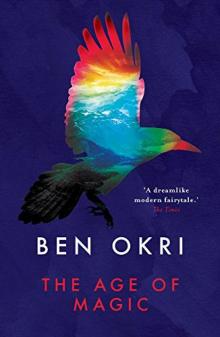 The Age of Magic
The Age of Magic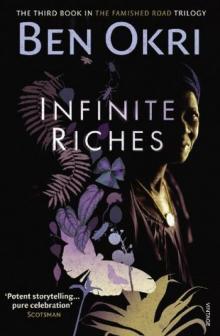 Infinite Riches
Infinite Riches Songs of Enchantment
Songs of Enchantment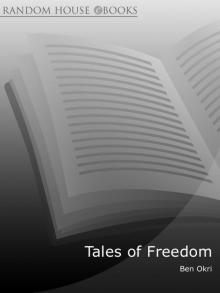 Tales of Freedom
Tales of Freedom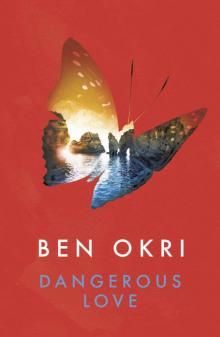 Dangerous Love
Dangerous Love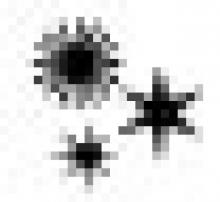 Starbook
Starbook The Famished Road
The Famished Road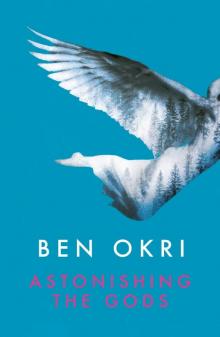 Astonishing the Gods
Astonishing the Gods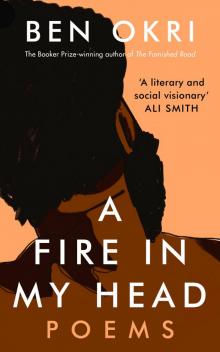 A Fire in My Head
A Fire in My Head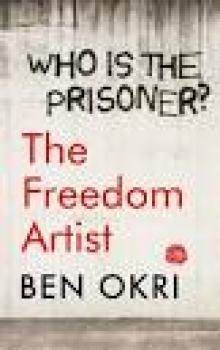 The Freedom Artist
The Freedom Artist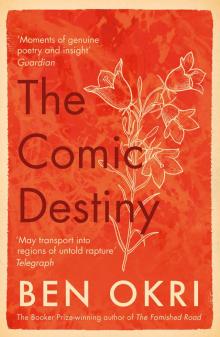 The Comic Destiny
The Comic Destiny A Way of Being Free
A Way of Being Free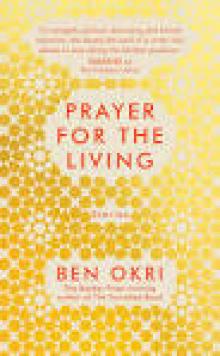 Prayer for the Living
Prayer for the Living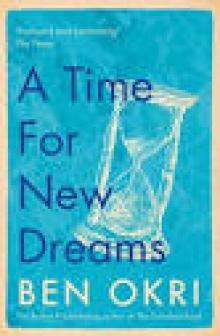 A Time for New Dreams
A Time for New Dreams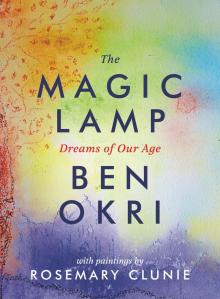 The Magic Lamp
The Magic Lamp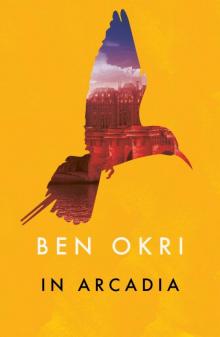 In Arcadia
In Arcadia